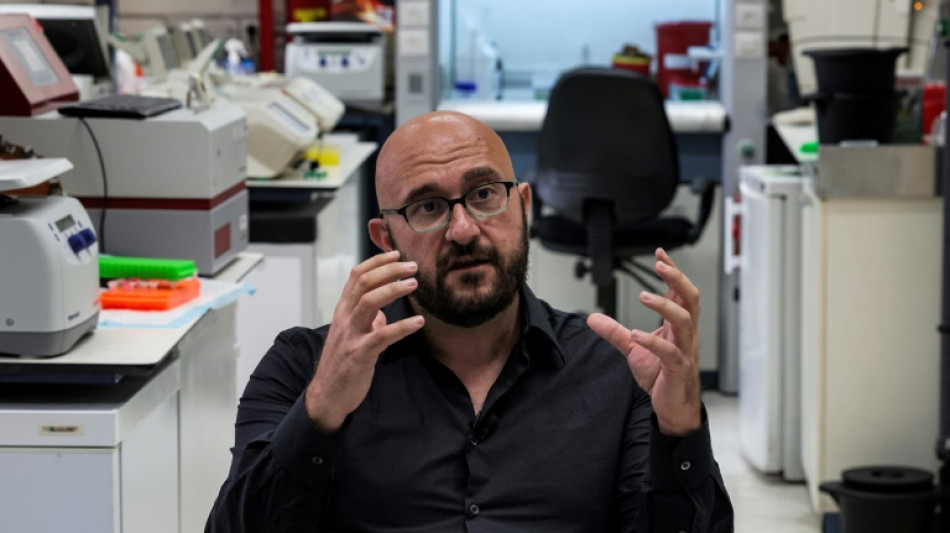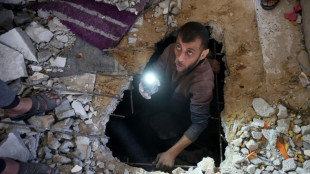
-
 Hamas says open to 5-year Gaza truce, one-time hostages release
Hamas says open to 5-year Gaza truce, one-time hostages release
-
Iran, US hold new round of high-stakes nuclear talks

-
 Up at dawn for front-row seat to history at Francis's funeral
Up at dawn for front-row seat to history at Francis's funeral
-
Pakistan ready to 'defend sovereignty' after India threats

-
 Huge crowds flock to Vatican for Pope Francis's funeral
Huge crowds flock to Vatican for Pope Francis's funeral
-
Xi says China must 'overcome' AI chip challenges

-
 Indian army says new exchange of gunfire with Pakistan
Indian army says new exchange of gunfire with Pakistan
-
Epstein accuser Virginia Giuffre takes own life in Australia: family

-
 Hundreds of buildings damaged, dozens injured in 6.3 Ecuador quake
Hundreds of buildings damaged, dozens injured in 6.3 Ecuador quake
-
India and Pakistan's Kashmir fallout hits economy too

-
 Francis's funeral to be grand farewell to 'pope of the poor'
Francis's funeral to be grand farewell to 'pope of the poor'
-
Pogacar faces defiant Evenepoel at Liege-Bastogne-Liege

-
 Chelsea eye great escape against Barcelona in Women's Champions League
Chelsea eye great escape against Barcelona in Women's Champions League
-
Iran, US to hold new round of high-level nuclear talks

-
 'Energy and effort' pay off for Reds as Blues' woes continue
'Energy and effort' pay off for Reds as Blues' woes continue
-
Albatross and closing birdie lift China's Liu to LPGA Chevron lead

-
 On the horizon? Wave of momentum for high seas treaty
On the horizon? Wave of momentum for high seas treaty
-
Top Mistakes to Avoid When Building Credit History

-
 Developing countries should fast-track US trade deals: World Bank president
Developing countries should fast-track US trade deals: World Bank president
-
Grizzlies' Morant 'doubtful' for must-win game 4 v Thunder

-
 Trump in Rome for pope funeral in first foreign trip of new term
Trump in Rome for pope funeral in first foreign trip of new term
-
Trump says Russia-Ukraine deal 'very close' after new Kremlin talks

-
 US rookies lead PGA pairs event with McIlroy and Lowry in hunt
US rookies lead PGA pairs event with McIlroy and Lowry in hunt
-
Trump tariff promises get a reality check

-
 Warriors coach Kerr 'relatively optimistic' injured Butler will play game 3
Warriors coach Kerr 'relatively optimistic' injured Butler will play game 3
-
Postecoglou hopes 'Stonecutter's Credo' can inspire Spurs

-
 PSG lose unbeaten Ligue 1 record ahead of Arsenal showdown
PSG lose unbeaten Ligue 1 record ahead of Arsenal showdown
-
Venezuela accuses El Salvador president of 'human trafficking'

-
 Own goal takes Sundowns to African final against Pyramids
Own goal takes Sundowns to African final against Pyramids
-
Scores of buildings damaged, 20 injured in Ecuador quake

-
 US stocks extend rally as market eyes busy calendar next week
US stocks extend rally as market eyes busy calendar next week
-
Pope's death triggers surge of disinformation he fought against

-
 Rovanpera takes control of Rally Islas Canarias
Rovanpera takes control of Rally Islas Canarias
-
Zelensky insists Crimea is Ukrainian as US envoy meets Putin

-
 Patel and Mendis help Sunrisers beat Kings in Dhoni's 400th T20
Patel and Mendis help Sunrisers beat Kings in Dhoni's 400th T20
-
Copa del Rey ref statements 'unacceptable': Real Madrid after boycotting final build-up

-
 Insurance CEO's accused killer pleads not guilty to federal murder charges
Insurance CEO's accused killer pleads not guilty to federal murder charges
-
FBI arrests Wisconsin judge for shielding undocumented migrant

-
 Brazil ex-president Collor de Mello jailed for corruption
Brazil ex-president Collor de Mello jailed for corruption
-
Zelensky insists Crimea 'belongs' to Ukraine as US envoy meets Putin

-
 Real Madrid boycott Copa del Rey build-up over referee complaints
Real Madrid boycott Copa del Rey build-up over referee complaints
-
Trinidad and Tobago votes for parliament, PM, with opposition in lead

-
 IMF chief hails 'constructive' Spring Meetings held under tariff uncertainty
IMF chief hails 'constructive' Spring Meetings held under tariff uncertainty
-
Iran FM Araghchi in Oman ahead of nuclear talks with US

-
 Dozens of buildings destroyed, 20 injured in Ecuador quake
Dozens of buildings destroyed, 20 injured in Ecuador quake
-
Young Barca must 'enjoy' Real Madrid Copa final fight: Flick

-
 Pakistan and India border closure separates families
Pakistan and India border closure separates families
-
Brazil's Bolsonaro 'stable' after post-surgery setback

-
 Catholics in secular Cuba hail Francis as 'bridge'
Catholics in secular Cuba hail Francis as 'bridge'
-
US envoy Witkoff, Putin discuss 'possibility' of direct Russia-Ukraine talks


Lab-grown human 'embryos' offer new research hope
Scientists have developed human embryo-like structures without using sperm, an egg or fertilisation, offering hope for research on miscarriage and birth defects but also raising fresh ethical concerns.
Earlier this year, several labs around the world released pre-print studies describing their development of early human embryo-like structures.
That work has not yet been peer-reviewed, but now one group's research has been published in the journal Nature, describing how they coaxed human embryonic stem cells to self-organise into a model resembling an early embryo.
The research was welcomed by some scientists as an "impressive" advance that could help unlock secrets about the precarious early stages of pregnancies, when failure is most common.
The work will however renew debate on the need for clearer ethical rules on development of lab-grown human embryo models.
The researchers, led by Palestinian scientist Jacob Hanna at the Weizmann Institute in Israel, harnesses the power of embryonic stem cells, which can become any kind of cell.
They produced embryo models up to 14 days old, which is the legal limit for such research in many countries, and the point at which organs like the brain begin to develop.
The researchers say their work differs from those of other teams because it uses chemically rather than genetically modified embryonic stem cells and produces models more like real human embryos, complete with yolk sac and amniotic cavity.
These similarities could make the models more useful for research into conditions like miscarriage, birth defects and infertility, said James Briscoe of Britain's Francis Crick Institute.
The model "seems to produce all of the different types of cells that form tissues at this early stage of development," said Briscoe, principal group leader and associate research director at the biomedical research charity.
The research "is a step towards opening a window on the period of human development where many pregnancies fail and which has been really difficult to study up until now."
Both the researchers and scientists not involved in the work emphasised that the models should not be considered human embryos.
The structure "highly resembles, but (is) not identical, to the in utero situation", the research notes.
The success rate on generating the models was also low, with the stem cells organising correctly just a small percentage of the time.
Still, the research and other recent work shows "that models of human embryos are getting more sophisticated and closer to events that occur during normal development," said Darius Widera, an expert in stem cell biology at the UK's University of Reading.
The work highlights "that a robust regulatory framework is more needed than ever before", he added.
In Britain, Cambridge University has begun developing the first governance framework for stem cell-based human embryo models.
The Weizmann Institute research does not involve transferring the models into a human or animal womb, or developing the structures beyond 14 days.
P.Martin--AMWN


